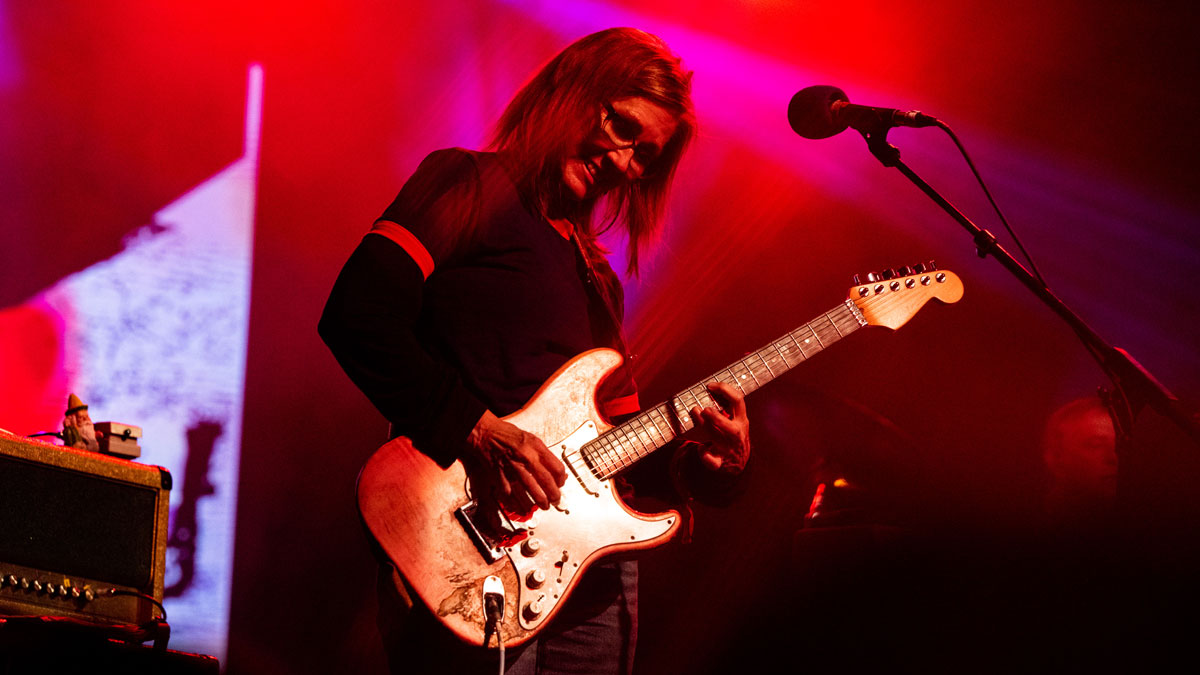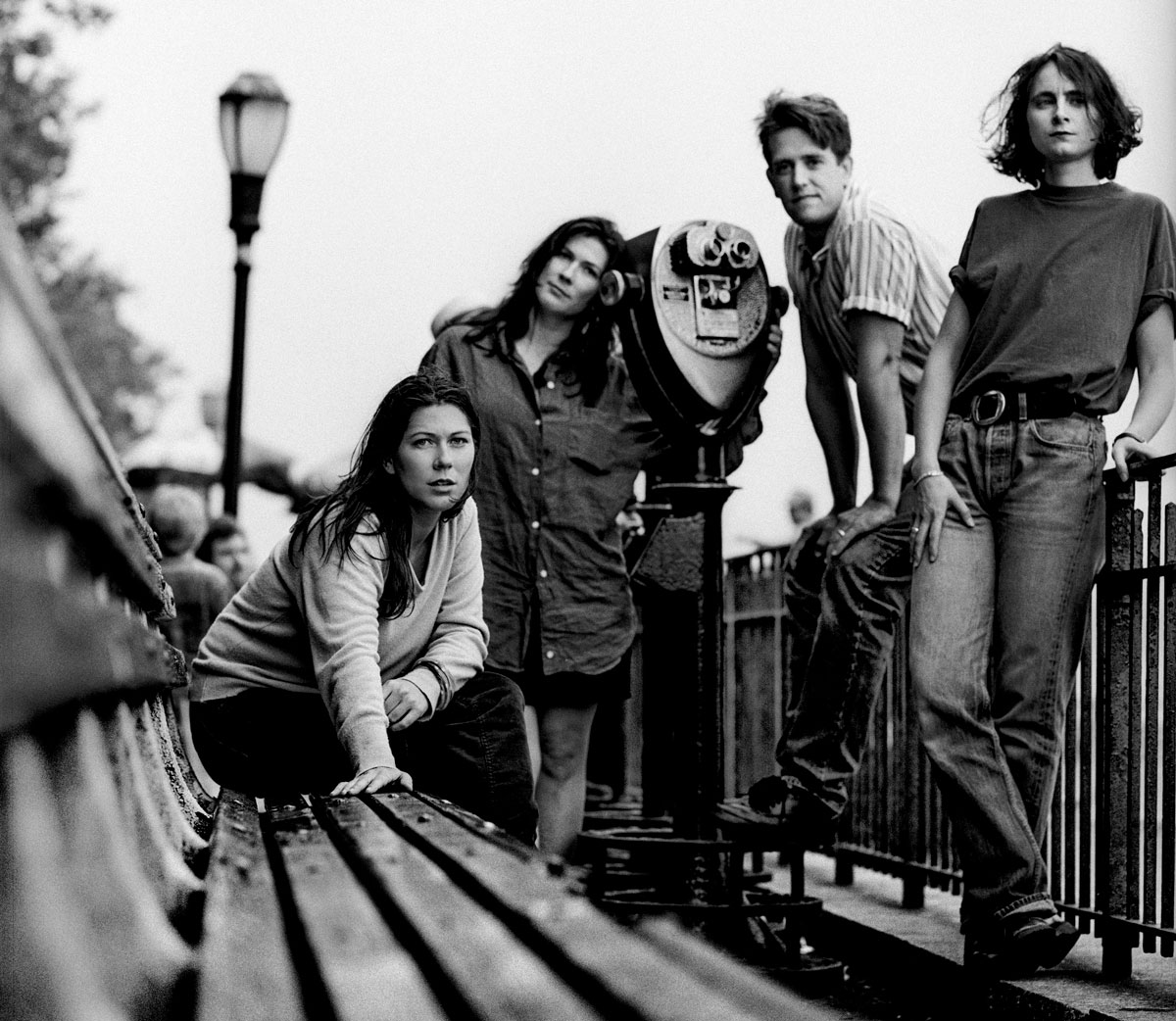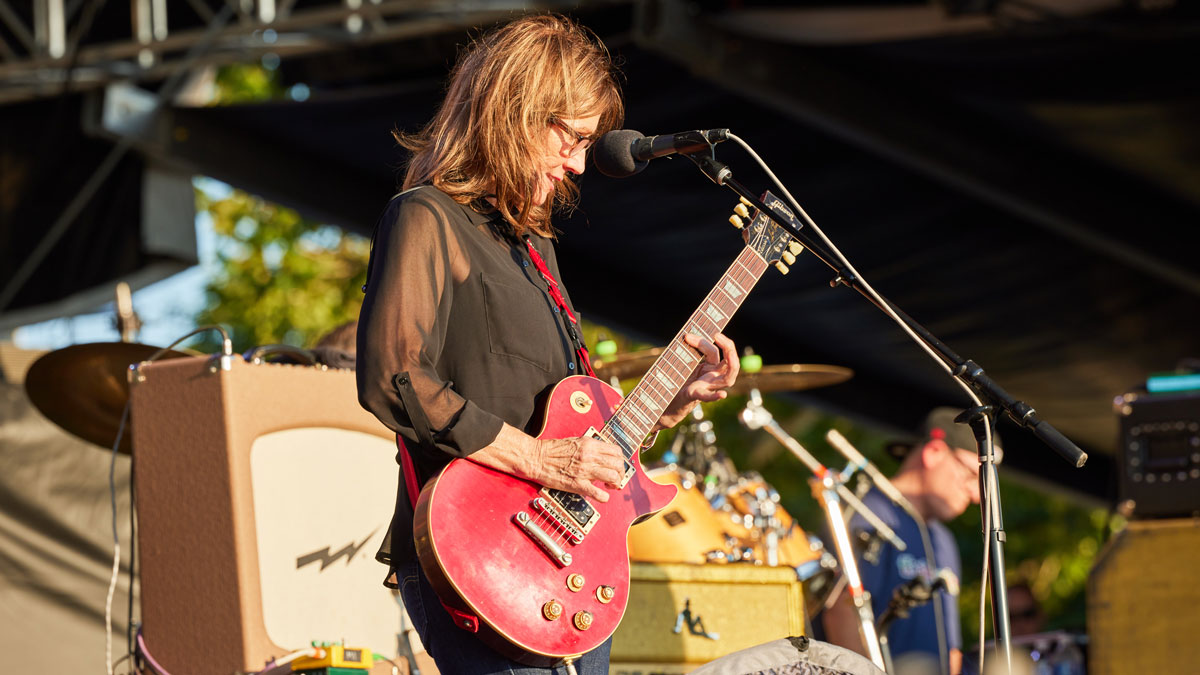“Kim invited me to join and asked, ‘What do you want to play?’ I said lead guitar – frankly, I was surprised she said yes”: Kelley Deal couldn’t play guitar when she joined the Breeders. A year later, she recorded a ’90s alt-rock masterpiece
30 years ago, the Breeders’ Last Splash would become a monster hit for former Pixies bassist Kim Deal and her sister Kelley. But at the outset of its recording, Kelley was still honing her guitar skills. She explains how Led Zeppelin set her on the six-string path and why she's no fan of the Fender Twin

Given the idiosyncratic nature of the guitars featured on the Breeders' 1993 smash Last Splash, it's hard to believe that Kelley Deal only picked up guitar a year or two before its recording.
Don't believe it? Just ask her: "All through school, I played drums," she reveals. "I even took private lessons and was very much into the drums. And then, when Kim [Deal] and I started playing locally, she was on guitar; I got a bass guitar, an Aria Pro II. And it was that same Aria that Kim 'borrowed' before she went off to Boston to play with the Pixies."
Fast-forward a few years, and Kim's first run with the Pixies had come and gone, as had Pod, her first record with her post-Pixies project, the Breeders. And while Pod had been a modest hit, the Breeders' initial configuration, which featured both Kim Deal and Tanya Donelly on guitar, didn't last as Donelly returned to her band, Belly, prompting Kim to draft in her sister Kelley.
There was only one issue: Kelley didn't play guitar.
"Kim asked me to join the Breeders and asked, 'Well, what do you want to play?'" Kelley explains. "I said, 'I want to play lead guitar' – frankly, it surprised me that she said yes. But I'd always loved guitar since I'd seen the Led Zeppelin movie The Song Remains the Same."
Given the Breeders' status as bastions of indie-rock, along with their delightfully angular take on guitar, the revelation that Deal's greatest inspiration was decidedly classic rock is something of a surprise.
"That Zeppelin movie blew my mind," she says. "There was something about it that just made sense to me. But I'm not talking about chords, rhythms, and leads; I'm talking about soundscapes. Making those sorts of soundscapes was something I wanted to do. I had no interest in shredding; I just wanted to play with sounds. I found that so compelling, and when I got the opportunity, when someone asked me to play, the first thing I said was, 'I want to play lead guitar.'"
Get The Pick Newsletter
All the latest guitar news, interviews, lessons, reviews, deals and more, direct to your inbox!
For Kelley Deal, no amount of experience or technique could compensate for the passion and foresight she brought to the band as the Breeders embarked on a journey to record what would become Last Splash.
"My thought was, 'If I can hum it, I can play it,'" Deal says. "I knew what we were recording didn't require shredding, so I could take an approach centered around serving the song.
"If you look at a song like Divine Hammer, it's a conversation between the violin and the mandolin. I'd play the mandolin part, and then our violinist, Carrie Bradley, would do a call-and-response with me.
"And then there was No Aloha, which was interesting because the hardest thing about that was making sure I landed on the right frets because, at that time, I didn't have much string control."
Elsewhere, in the Soon-To-Be-An-Indie-Anthem Department, songs like Cannonball were percolating. Of course, at the time, neither of the Deal sisters imagined the song would become so well-loved. As for Kelley, she was focused on extracting the sounds from a host of tried-and-true gear.
"The gear we used is easy to recall because it's the same gear I still use today," Deal laughs. "It was a Marshall JCM800, which is such a workhorse. I used that on Cannonball and most of Last Splash. I've been on tour and had access to other amps, but I always go back to my Marshall. I still thank God for that amp because it's so versatile."
And as far as guitars go, Deal says, "I still use the same Les Paul that I got in Philadelphia. I didn't record with it, but I did get it while on the Last Splash tour. I also had a Fender Strat and a Mustang, like Kurt Cobain had – only mine is a weird blue color with a red tortoiseshell pickguard. I used the Strat on Last Splash but didn't get the Mustang until we were on tour."
As Deal looks back on the Cannonball and Divine Hammer sessions, it's easy to forget she was a novice player while recording them.
"I remember Cannonball being one where I had to mute the strings," she says. "And I mentioned Divine Hammer before; that song was a last-minute addition. I remember we got stuck and ended up thinking, 'I wonder what J Mascis would do with this song,' and we sent it to him. He ended up putting a vocal on it and some guitar. It's not the version that ended up on Last Splash, but it will be part of the reissue; we call it Divine Mascis."
While many of Last Splash's tracks are riff-driven, it does host several gentler moments, such as Drivin' on 9, which Deal says is a perfect encapsulation of the Breeders' "art rock band mentality".

"I'm glad you mentioned that song," she beams. "Because we've always believed this band is an art rock band first. Look at songs like Drivin' on 9 or Roi; those are beautiful! But as far as what inspired me while we recorded Drivin' on 9, me and Kim were always into classic country, like Hank Williams. So, we always loved country, but not shitty country that sounds gross [laughs]."
At this point, we remind Deal that she wasn't learning only guitar on the fly while recording Last Splash but also mandolin and lap steel, which was no small feat.
Ever humble, Deal explains, "I may have been learning, but the concepts were not new to me. If I had been someone who was sitting down and learning all of that for the first time, I think it would have been harder.
"The biggest thing was getting the mechanics of where to put my fingers down, which came pretty easily. And again, I wasn't shredding, so I could play with feedback, crazy noises, and go into a room and make a racket."
Of course, pedals were behind some of those "crazy noises". Considering Deal was backed by a Marshall amp known for its pedal-platform prowess, a bevy of tasty stompboxes beckoned at her feet.
"Oh, I was a kid in a candy store," Deal reflects. "I had a Boss Digital Delay [DD-3], which I still have on my 'board. And I had an Ibanez Tube King, which I still have, too. But I love the Boss Digital Delay; it gives the guitar such a wonderful, sour, metallic sound. It's almost sneery and just such a cool pedal."
But the Marshall JCM800 wasn't the only amp Deal plugged into: "Oh! I had this beautiful Montgomery Ward Tube Tremolo, which sounded gorgeous. And this was before eBay and stuff, so you could go to a pawn shop and get stuff like that cheap. That amp gave so much texture; it's just so beautiful."
Considering Last Splash was recorded in an era awash in new and improved tech, you have to wonder what led Deal to err toward vintage kit.
"I never cared what was cool, you know?" he says. "And like I was saying before, I loved the stuff I chose because they're indestructible and are great platforms for pedals. And I had a Fender Twin, too, but I never used that motherfucker. Because the thing with a Twin is that it does one thing well, and that's all it does. It doesn't matter what guitar or pedal you put through it; all it ever will be is a Fender Twin."
"Here's the thing: the last thing I wanted was not to be able to model my sound by what the song required. I have to be able to set the tone with my gear, and with a Twin, I couldn't do that. I need to be able to say, 'Am I happy? Am I sinister? Am I dumb?' I had all these questions I need to answer with my guitar, and with the Fender Twin, you can't do any of that."
Last Splash put the Breeders on the map, firmly establishing them as an indie powerhouse to be reckoned with. Of course, a big part was Deal's insistence on developing herself rather than following the path Tanya Donelly had trodden on Pod
"It would never occur to me to duplicate someone else," Deal says.
"But it's funny, I did an interview with someone a couple of weeks ago, and they asked me to 'describe my style', and I had to say, 'I don't know. I have no idea.' The truth is I don't have a 'style'. It depends on the song… whatever the song is, that's the style I go with."
30 years on, you can see the influence of Last Splash and Kelley Deal's off-kilter guitar heroics in the new generation of young players who were inspired to pick up the guitar for the first time.
Modest as she is, Deal seems to agree, admitting, "I think there's something to that because, back then, there was this feeling that left so many of us feeling misrepresented. There was this idea that you had to be a certain type of person to play guitar in a band. I'm glad I did my part to remind people that guitar is open to everyone because it's art. I wanted to make sure people knew that and could say, 'Hey, I can pick up a guitar, too.'"

Indeed, Last Splash still holds water, but it probably means the most to Deal as it represents a period she'll never forget. "It was a fun time in music," she says. "There was an innocence; everybody was doing a bunch of drugs; it was before Kurt's [Cobain] suicide, and it was when mainstream music got out from under metal."
She concludes, "Maybe I was just too old for all that shredding and high-tech, hyper-masculine stuff; none of that made much sense to me. I don't know... maybe if I were younger, I would have gotten into that more."
"But as far as Last Splash goes, I'm very thankful for how patient everyone was with me as I recorded my parts. It must have taken some restraint knowing that every person in the studio except Jim [MacPherson], the drummer, could have grabbed my guitar and played my parts [laughs]. But they didn't do that. They stood back and let me work them out. I'm thankful for that and delighted people still like the record."
Andrew Daly is an iced-coffee-addicted, oddball Telecaster-playing, alfredo pasta-loving journalist from Long Island, NY, who, in addition to being a contributing writer for Guitar World, scribes for Bass Player, Guitar Player, Guitarist, and MusicRadar. Andrew has interviewed favorites like Ace Frehley, Johnny Marr, Vito Bratta, Bruce Kulick, Joe Perry, Brad Whitford, Tom Morello, Rich Robinson, and Paul Stanley, while his all-time favorite (rhythm player), Keith Richards, continues to elude him.
“There’d been three-minute solos, which were just ridiculous – and knackering to play live!” Stoner-doom merchants Sergeant Thunderhoof may have toned down the self-indulgence, but their 10-minute epics still get medieval on your eardrums
“There’s a slight latency in there. You can’t be super-accurate”: Yngwie Malmsteen names the guitar picks that don’t work for shred


![A black-and-white action shot of Sergeant Thunderhoof perform live: [from left] Mark Sayer, Dan Flitcroft, Jim Camp and Josh Gallop](https://cdn.mos.cms.futurecdn.net/am3UhJbsxAE239XRRZ8zC8.jpg)







